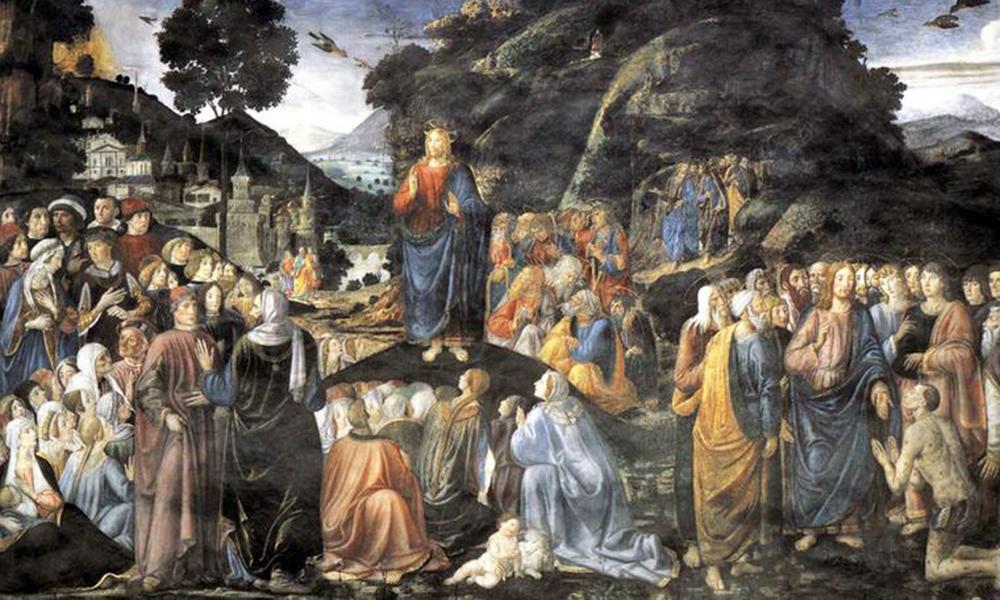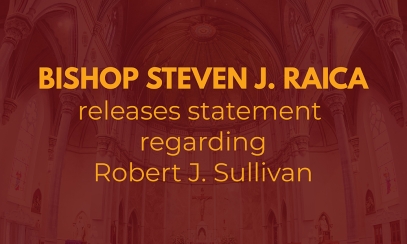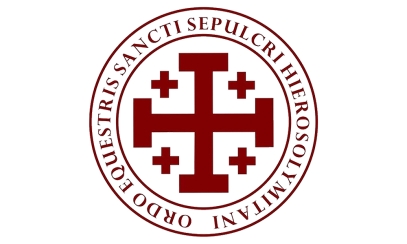
‘Sermon on the Plain’
Bishop Raica Celebrates the 6th Sunday in Ordinary Time
Bishop Raica Celebrates the 6th Sunday in Ordinary Time
On Feb. 13, Bishop Raica celebrated Mass at the Cathedral of St. Paul, marking the 6th Sunday in Ordinary Time. The complete text of his homily follows herein.
On Feb. 13, Bishop Raica celebrated Mass at the Cathedral of St. Paul, marking the 6th Sunday in Ordinary Time. The complete text of his homily follows herein.
My dear friends, on this Superbowl weekend featuring the LA Rams and the Cincinnati Bengals, we are reminded how much effort it takes to make it to the top. It requires a lot of work, concentration, effort, skill, at times a calculated risk, and a lot of preparation to get there. Like the Olympics, it’s where preparation meets opportunity! There is the drama of opposing teams striving for the ultimate prize – the victory over all victories. After the achievement is done, then what? What’s next? The applause and cheers subside. Life returns to a more mundane routine. How can we move on to the next season and strive with the right amount of teamwork and skill to reach for the stars once again? What gives glory for some is what we do and accomplish! Our faith, however, pivots on this point to say that we are not the product of what we do, but who we are in the fullness of our human dignity – whether strong or weak, healthy or sick, young or old, unborn or suffering from dementia. The dignity of every human being is the glory of God in our midst.
We have some fascinating scripture readings today that help us frame our desires, our responses. Both the first reading and the Gospel from Luke point out the dichotomy. The great prophet Jeremiah, who lived about 650 BC – 570 BC, speaks about the contrast between those “cursed” and those “blessed.” The prophecy Jeremiah utters, and is proclaimed today, comes from the “Lord God” Himself, Jeremiah notes.
The Gospel from Luke, situated on the plain and often referred to by scholars as the “Sermon on the Plain” as one would characterize the “stretch of level ground” referred to in the Gospel passage, is distinguished from the “Sermon on the Mount” of St. Matthew, familiar to many of us. The latter sermon has a series of “blessed” or “happy” statements – the poor in spirit, those mourning, those persecuted for righteousness’ sake, and so on. It constitutes a sort of preamble to the rest of the sermon that continues on for several chapters of St. Matthew’s Gospel and would be significantly longer than today’s reflection. The “Sermon on the Plain,” in today’s reading from the Gospel of Luke, provides a point / counterpoint, contrasting those who are “blessed” and those who are “cursed” with “woe to you.”
We cannot but think of how we may fall in one of those two overarching categories. Our Lord does not give us a middle ground or a category that says, “And for those still on the fence … those in middle … those on the mezzanine level.” He rather looks at the decisions we have made and the desires of our hearts. He sees if it trends to happiness, peace, and joy – that is, blessed or hope-filled - or, if it cuts off all prospects of hope, resulting in separation, aloneness, chaos, and abandonment and thus trends toward “woe.”
Today, we have a great joy because in our Christian faith. We, as believers, are people of hope with a certainty about things unseen. We are urged to live in friendship with God regardless of other physical maladies or worldly measures, which, at the end of the day, can leave us empty and alone.
To illustrate this point, a pastoral minister shared her reflections of ministry. She was asked to visit the senior citizens who lived in a high rise nearby the church. She made the rounds at the various apartments, knocking on doors and meeting up with the residents there. Afterward, she reflected on what she had experienced. Those who were Christian and Catholic, even though they may have lived alone, lived as though someone was with them always. They were aware of a special presence of the Lord with them. They were generally more cheerful and hopeful, looking forward to the day. On the other hand, those who were unbelievers generally tended to be dour and lacking hope. They seemed sad because of their loneliness. No one else was there. Here was an experience of blessedness and woes. I’m sure there are many more that you could highlight as well.
When we are blessed, we know we are planted near relationships that can nourish us, feed us, with others concerned about our welfare. When we are cursed, we are cut off, having to go it alone - not having anyone to turn to. Truly, a sad state of affairs! How many today wander through life alone, searching, aimlessly meandering to some unknown goal. For us Christians, us believers, we know to Whom we belong (i.e., the One who is our origin and our goal).
The readings we have today, and our psalm response, underscore the vitality of what it means to be in relationship with each other and with God. Sometimes it’s described as having roots and wings. The roots because we are anchored. Our tendrils reach down into the soil to find the living water that can satiate our thirst and allow us to stretch skyward toward the sun, the light. The wings because it represents our freedom by which we can latch on to a gust of wind to soar where we need to go next.
Of course, these are metaphors that help us understand our lives – blessed and cursed, happiness and woefulness, roots and wings. Our discipleship helps us attain the height of our potential – the fullness of life that exemplifies what God’s dream is for each of us. It will be something to experience in its fullness, in its abundance! Is it possible to live this way? Yes! It is possible to live this way! In our tradition, we have saints testify that it can be done.
So, my friends, “Rejoice and leap for joy on that day! Behold, your reward will be great in Heaven!” May God bless you!



